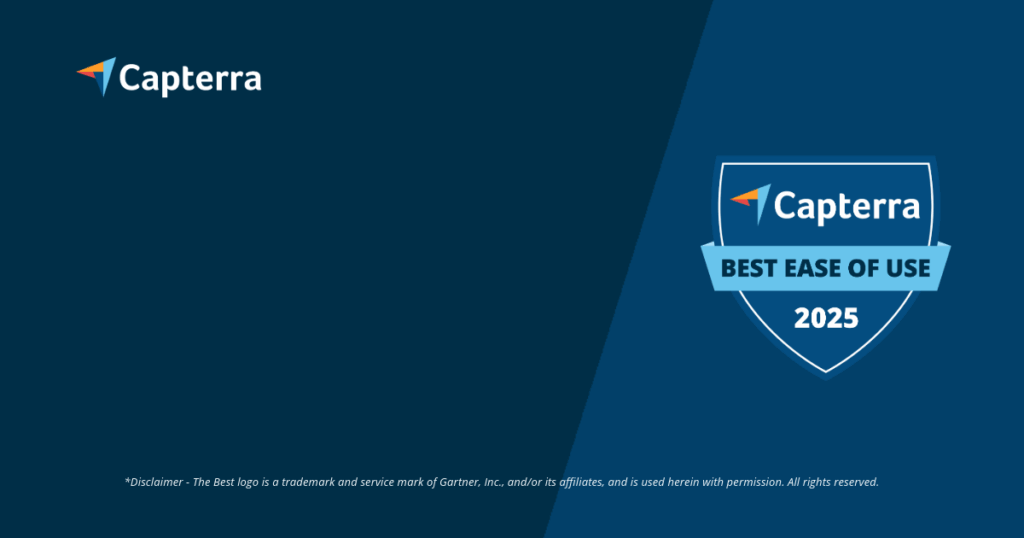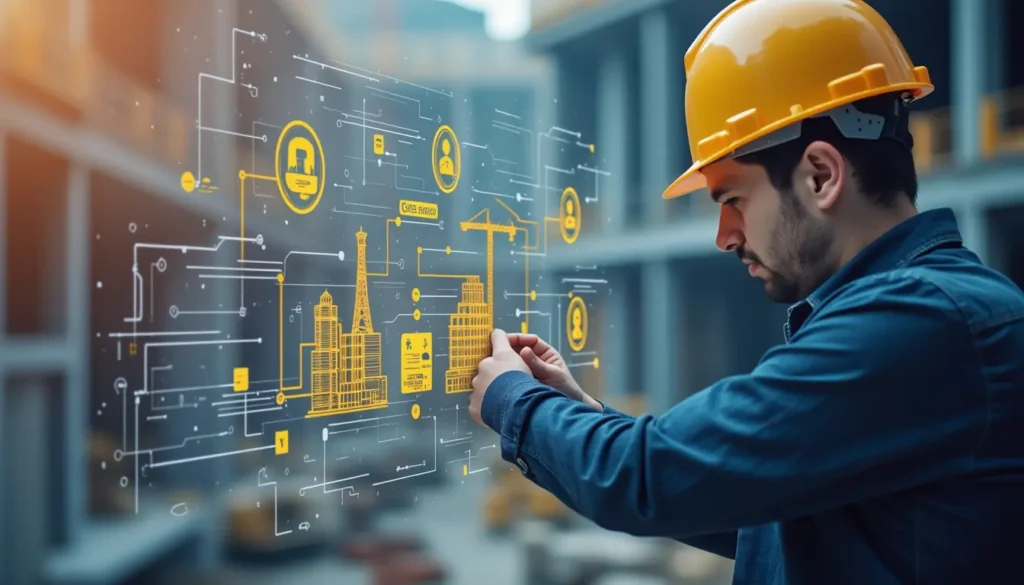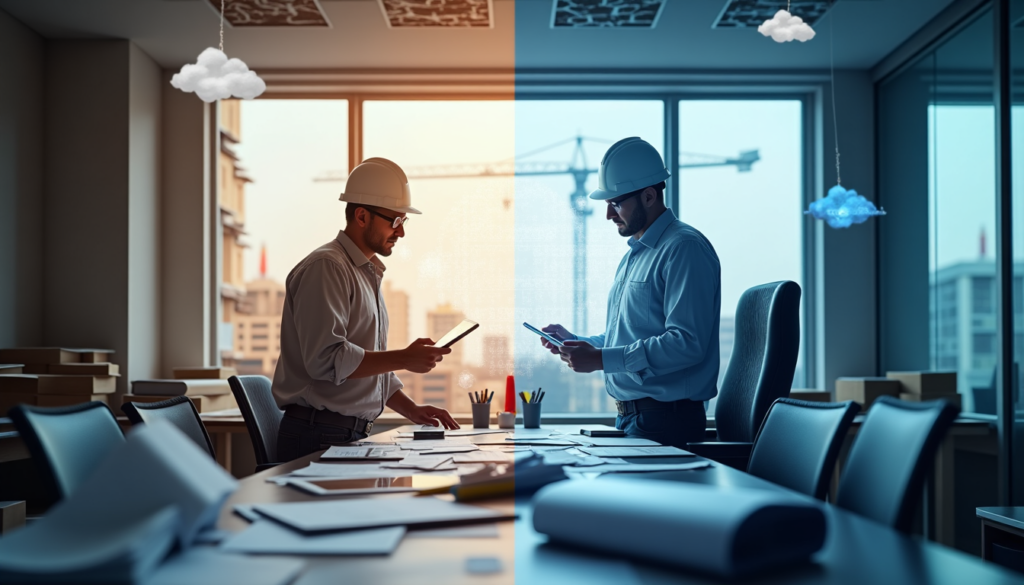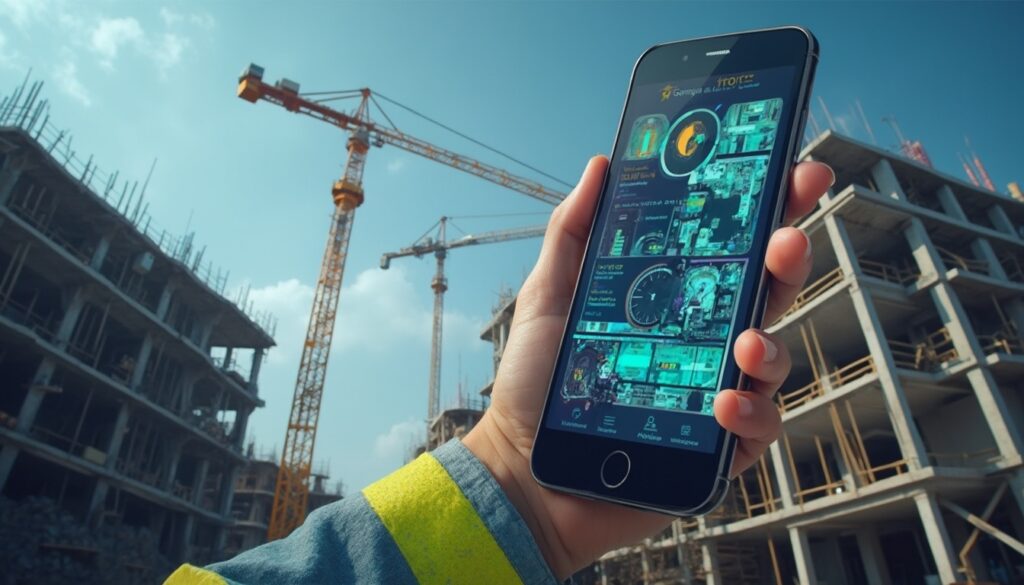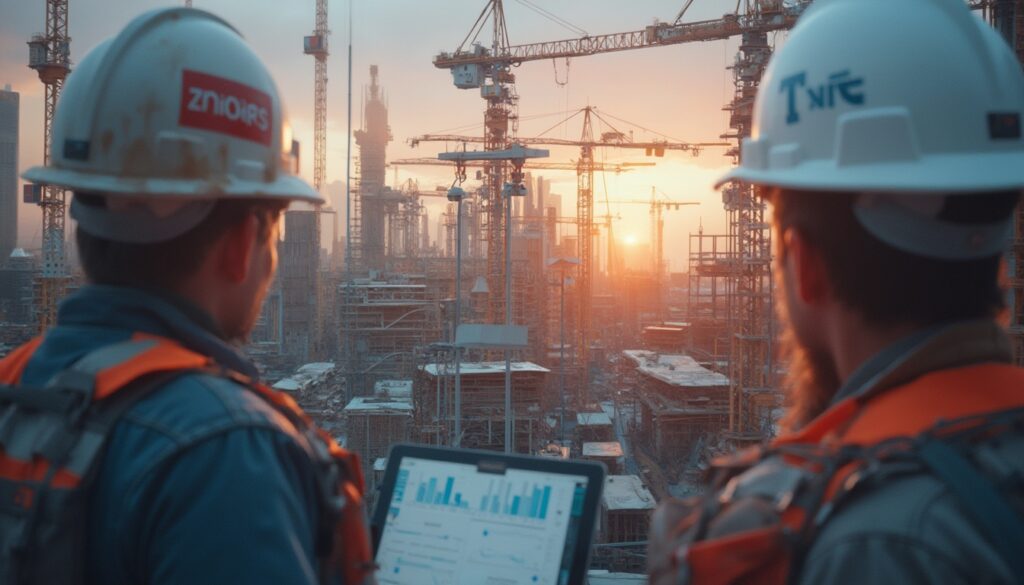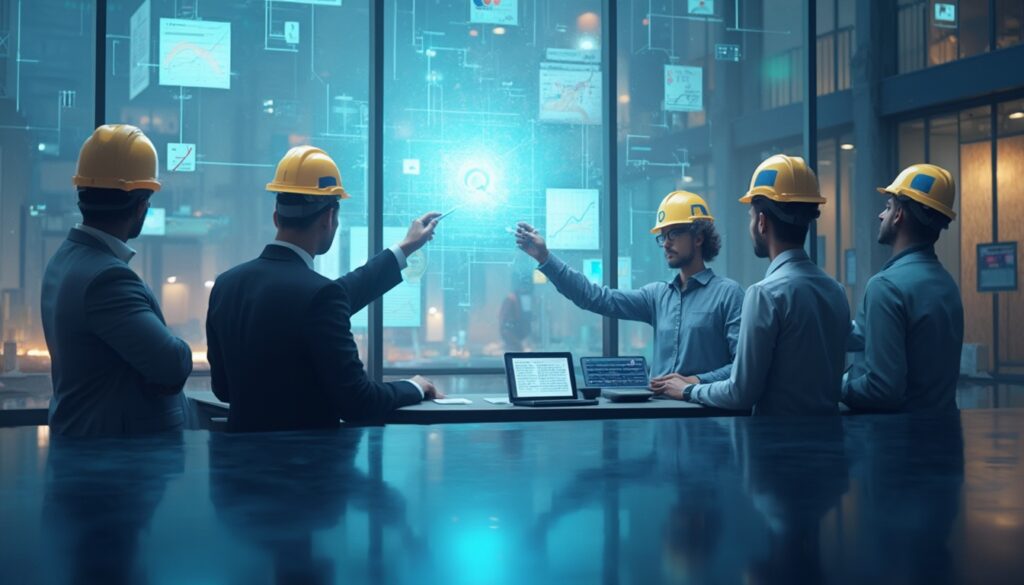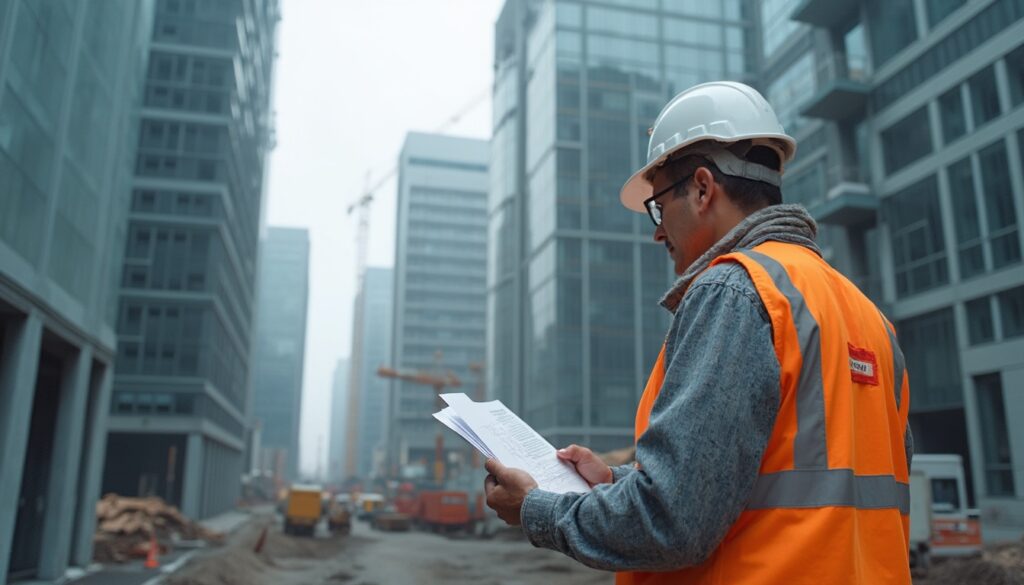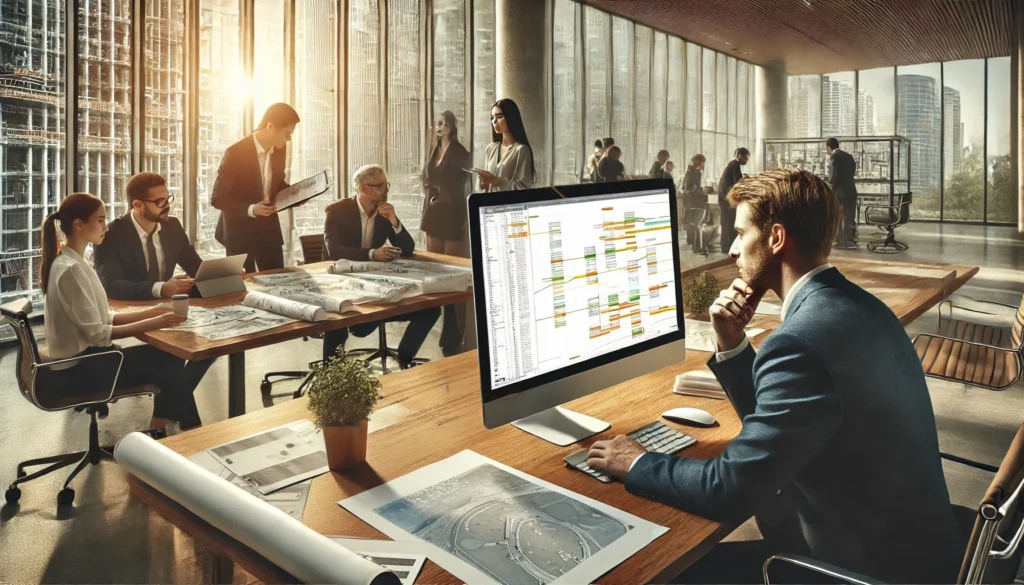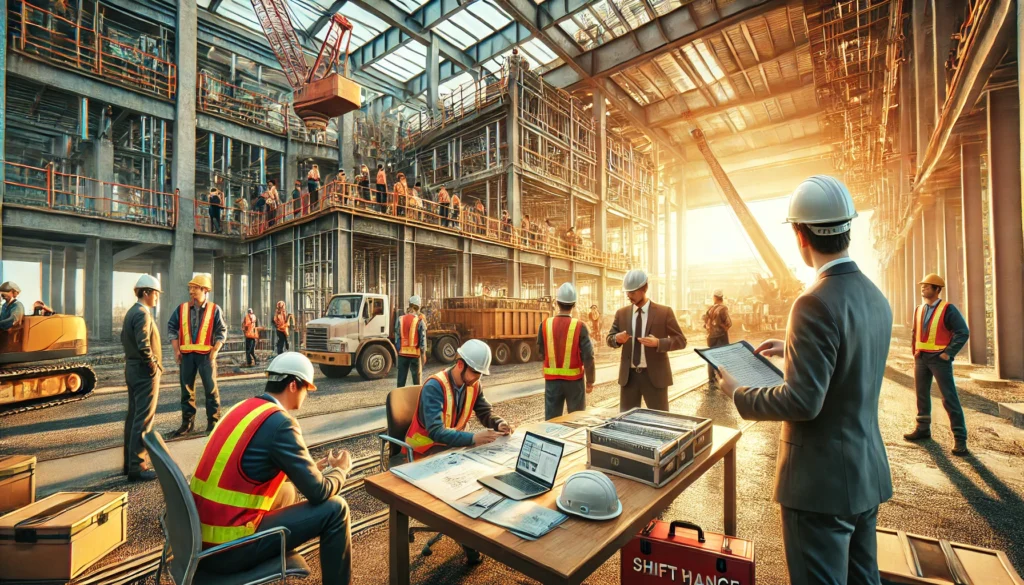Major projects in Düsseldorf: How to set planning and communication on a course for success
Düsseldorf is pulsating! As a dynamic economic metropolis, our city is the scene of numerous major projects Düsseldorf, which not only change the city’s appearance but also elevate our infrastructure to a new level. Clearly, such undertakings are economically vital, but they also demand a lot from everyone involved. This is where efficient project execution comes into play. We at Valoon GmbH understand the complexity of such mammoth tasks from personal experience and have solutions ready to significantly optimize your communication and project management processes. In this article, we want to show you how to master the typical challenges of such projects in Düsseldorf and bring your construction plans securely to the finish line. And of course, you will also learn how our software can help you consolidate information flows and benefit from the latest digital opportunities.
- The central role of major projects for Düsseldorf’s economic dynamism and infrastructural development.
- The necessity for efficient project execution and optimized communication and project management processes.
- Approaches to overcoming typical challenges in major projects in Düsseldorf.
- The added value of modern software for consolidating information flows and leveraging digital opportunities.
The significance of major projects for Düsseldorf
It cannot be said often enough: Major projects Düsseldorf are true engines for our urban development. They not only provide urgently needed new housing and modern workplaces, but also noticeably enhance the quality of life – whether through improved infrastructure or attractive public spaces that invite you to linger. Just think of projects like the or the creation of entirely new urban quarters – these are impressive examples of the ambitious goals we are pursuing here in Düsseldorf. Such projects are magnets for investment, drive innovations forward, and solidify Düsseldorf’s reputation as a top economic location. But, and this is the crux of the matter, the success of these undertakings hinges on watertight planning, sharp Controlling in major projects and communication that includes everyone. Only then can we avoid annoying delays and cost explosions that we unfortunately know from some public construction projects.
Why this article?
So why this article? Simple: We want to take a closer look at the many facets of major projects Düsseldorf once again – from current urban development plans to exciting approaches in sustainable architecture to the concrete challenges that the construction industry faces here on a daily basis. Our goal is to provide you with practical insights and concrete solutions so that you can bring your projects to fruition even more efficiently. Because let’s be honest: With the complexity and number of stakeholders involved in such undertakings, optimized management is simply worth its weight in gold. We want to show you how to keep an overview with modern tools and elevate team collaboration to a new level. A well-thought-out Action plan for major projects is often already half the battle.
Overview of the topics
What can you expect specifically? We will dive into the current visions of Düsseldorf’s urban development, take a look at the projects of the urban planning office, and highlight the important topic of housing creation. Sustainable architecture and the smart integration of green spaces will also be given their place. Also, we will scrutinize the colorful diversity of housing projects and we won’t shy away from critical topics such as delays and budget overruns in major projects Düsseldorf. Finally, we will look at what is happening in terms of infrastructure, what the mobility plan 2030 holds for us, and how the municipal housing company is getting involved. Because we are convinced: For all companies that are involved in such undertakings, understanding these dynamics and having the know-how to successful major projects is essential.Düsseldorf’s urban development: How major projects are changing our city and making it fit for the future
Düsseldorf is constantly changing – a dynamic transformation where major projects Düsseldorf clearly sets the tone. The goal? To make our city fit for the future, create modern housing, and continuously enhance the quality of life for all of us here. The visions are diverse: It’s about intelligently densifying existing urban spaces as well as unlocking entirely new areas. It is particularly important to strike a good balance between living, working, and leisure to create vibrant and attractive neighborhoods where people feel at home. But it is also clear: coordinating all these different undertakings is a true challenge and requires precise planning and powerful management to truly achieve these ambitious goals.
- Major projects as a driver of urban development: Creating modern housing and improving quality of life.
- The role of the urban planning office: Guiding development through projects by city districts, building plan, and quality assurance procedures.
- Focus on housing creation: Urban densification and development of new urban quarters (e.g., Grand Central, Deiker Höfe, Mörsenbroicher Ei).
- Challenge: Precise planning and powerful management to coordinate the diversity of projects.
Overview of ongoing and planned major projects
When you look around, the pipeline of ongoing and planned major projects Düsseldorf is truly impressive. For example, there are huge housing construction projects, such as the development on the sites of the Adler Group, where potentially 5,000 new apartments could be created – including well-known names like Grand Central and the Glasmacherviertel. Also, projects like Belsenpark II with around 1,000 planned units clearly show what is being moved here. But it’s not just about housing: Infrastructure projects, such as the or the redesign of Konrad-Adenauer-Platz, are also vital building blocks for the development of our city. All these undertakings are absolutely crucial to ensure our city is future-proof. And for that, we need a good Guide for major projects, which provides orientation.
Urban planning office Düsseldorf: Projects by city districts
A very important role in steering urban development and thus also in many major projects Düsseldorf is naturally played by the . Here you get a detailed overview of the projects, neatly sorted by the ten city districts. This transparency is great, as it allows residents and investors to directly learn what is happening in their neighborhoods. The range of projects is vast: From building plan procedures to special quality assurance processes that ensure the urban planning quality is really up to standard. For those wanting to dive deeper, the office also provides the appropriate contact information for detailed insights into project development and the urban planning framework. Such a structured approach is simply fundamental for projects to succeed and contribute to sustainable urban development.
City districts 1-10: An overview
Our city Düsseldorf is divided into ten city districts, each with its own development focuses and of course its specific major projects Düsseldorf. For example, take city district 1, which includes the Old Town and city center, or city district 3 with areas like Bilk and the harbor. Each of these districts has its very own character, and thus also special challenges that must of course be considered in the planning. This decentralized perspective is great because it allows for development that is truly tailored to local needs. Key to harmonious overall development and the success of the many projects is undoubtedly the good coordination between the individual districts and the overarching strategy for the whole city.
Building plan procedures and quality assurance procedures
In order for major projects Düsseldorf to be realized at all, there are various planning legal tools. Building plan procedures, for instance, create binding building rights – they define what can be built on a property and how it can be used. Then there are quality assurance procedures, such as urban planning competitions or workshop procedures. These are aimed at ensuring high design and functional standards in such undertakings. Such procedures bring planners, investors, and the public together and help ensure that the projects genuinely meet the high demands of modern urban development. When these procedures are carried out carefully, they are a good guarantee for sustainable projects that are accepted by the community.
Housing creation and urban densification
Housing is in high demand in Düsseldorf – therefore, creating new apartments is naturally a top topic of urban development and a real engine for many major projects Düsseldorf. The so-called urban densification, smartly filling in existing settlement areas, plays a significant role here. This way, we can keep land consumption low while still enabling urban living. Of course, this requires innovative concepts that focus not only on quantity but especially on the quality of the housing. The big challenge is to achieve this densification in a socially acceptable manner while ensuring that green and open spaces are preserved or even newly created. This balance is extremely important for housing projects to be embraced and successful.
Grand Central Project: An example of urban densification
A real model example of successful urban densification and a truly significant project in Düsseldorf is the Grand Central Project on the site of the former freight station. A completely new urban quarter is currently emerging there, with a colorful mix of living, working, and leisure opportunities. By reusing this inner-city wasteland, not only is new housing created, but the infrastructure is improved, and a really attractive environment for future residents is being built. Such major projects Düsseldorf are great examples of how intelligent planning and infill can optimally use valuable land in the city – to meet the growing demand for housing while simultaneously upgrading the entire urban structure. It’s clear: Careful planning of the Financing of major projects is an absolutely critical factor for success.
Deiker Höfe: High-quality housing and quality of life
The Deiker Höfe are another great example. This project in Düsseldorf impressively demonstrates that it’s not just about the sheer number of apartments, but above all about creating high-quality housing that truly enhances people’s quality of life. Special emphasis is placed on attractive architecture, well-thought-out floor plans, and ensuring that green and communal spaces are well integrated. The goal is clear: to create a residential environment that perfectly meets the needs of modern city dwellers and offers a lot of living comfort. Such major projects Düsseldorf make our city even more attractive as a residential location and show that sustainability and social aspects play a significant role even in new builds.
Mörsenbroicher Ei: Redevelopment with high-rise buildings
A significant change is imminent at Mörsenbroicher Ei. This ambitious project in Düsseldorf has the potential to create over 1,000 new apartments and office spaces through high-rise buildings. Developers like Art-Invest and Nexus Investment are driving this exciting initiative forward. To create a truly integrated and well-functioning quarter with mixed use, coordination among all stakeholders is obviously key. Urban planning director Cornelia Zuschke repeatedly emphasizes how important solid planning is for the success of this major projects Düsseldorf . Clearly, with high-rise projects of this magnitude, urban, traffic, and social aspects must be scrutinized particularly carefully.Sustainable architecture in Düsseldorf: Green visions for climate-friendly large projects
In Düsseldorf, we have ambitious goals when it comes to sustainable architecture – especially in implementing major projects Düsseldorf. Our city relies on a smart connection of great design and ecological responsibility to create buildings and neighborhoods that are truly future-proof. This is evident in innovative construction concepts that prioritize energy efficiency, resource conservation, and the integration of green spaces into urban areas. The path towards climate-neutral projects is a crucial building block of our urban sustainability strategy, demonstrating that awareness of eco-friendly building is growing stronger. Of course, the choice of the right construction companies for large projects, who share this vision with us.
Architectural projects with a focus on sustainability
It is increasingly visible in Düsseldorf: Architectural major projects Düsseldorf, where sustainability is clearly at the center. These involve CO2-neutral designs, the use of wood as a smart, renewable resource, and the greening of facades and roofs. Such projects are not only ecological role models but also set impressive design accents in the urban landscape. They compellingly demonstrate that ambitious architecture and environmental responsibility can go hand in hand. To realize such projects, it certainly requires a lot of know-how and innovation from everyone involved – from architects and planners to the construction companies that implement them.
CO2-neutral designs and green facades
A very important aspect of sustainable major projects Düsseldorf is to keep the carbon footprint as small as possible. This is achieved through energy-efficient construction methods, the use of renewable energies, and materials that produce as little emissions as possible. And then there are the green facades and roofs: They not only look stylish and improve the microclimate and biodiversity, but also significantly enhance the quality of life and well-being of the people living or working there. These elements increasingly shape the image of modern construction projects and are a strong sign of ecological awareness and forward-thinking urban design.
Tadao Ando Campus & Tower: Concrete, wood, and vertical greening
A truly outstanding example of sustainable architecture in the context of major projects Düsseldorf is the Tadao Ando Campus & Tower. This project is an exciting mix of concrete, wood, and a hybrid structure, placing great emphasis on public accessibility and vertical greening. The careful selection of materials and the innovative design aim to set new standards in both aesthetics and ecology. The vertical greening helps improve air quality and creates a visually appealing connection to nature. Such projects show how thoughtful architecture can contribute to creating livable and sustainable urban spaces.
The Cradle: Wood hybrid office building with material reuse
“The Cradle” in Düsseldorf’s MedienHafen is a true lighthouse project among the major projects Düsseldorf and a groundbreaking wood hybrid office building. Here, the cradle-to-cradle approach is consistently pursued. This means materials are used in such a way that they can be reused or recycled after their use. The extensive use of wood as the main construction material binds CO2 and significantly reduces the building’s ecological footprint. This innovative concept for construction projects sets new standards for resource-saving construction and demonstrates the enormous potential of circular economy approaches for the construction industry. A great example of how large projects do not fail, but can become truly successful through innovation.
JEP1: Ingenhoven building with public green roof
The JEP1 building (Johann-Pflügler-Straße 1) designed by Ingenhoven Architects is another example of sustainable major projects Düsseldorf, particularly noteworthy for its publicly accessible green roof. This green oasis on the roof is not only a beautiful place for recreation for everyone but also improves the urban climate and promotes biodiversity. The project emphasizes how much our city is committed to harmoniously bringing together nature and architecture. Initiatives that combine ecological aspects with real benefits for people are incredibly important for the development of a livable and future-proof city.
Integration of nature into urban planning
Incorporating nature more into urban planning is a central concern in developing major projects Düsseldorf. It is about creating green infrastructures that enhance the well-being of us citizens, promote ecological diversity, and help us adapt to climate change. Specifically, this means: more parks and green corridors, green buildings, and the creation of water areas. Such measures not only look good but also have positive effects on the urban climate and air quality. If we consistently implement these principles in all construction projects, it will be an important step towards a greener and more resilient city.
Extensive green roofs and facades
Extensive green roofs and facade greening are important building blocks of the green infrastructure in many major projects Düsseldorf. They help reduce rainwater runoff, improve the thermal insulation of buildings, and provide habitats for insects and birds. Moreover, they slightly cool the ambient temperature and filter air pollutants. The fact that these techniques are being increasingly used in new constructions and renovations shows that awareness of the many benefits of nature-based solutions in urban development is steadily growing.
Goal: Climate neutrality by 2035
Düsseldorf has set itself a truly ambitious goal: By 2035, we want to be climate neutral. And it is clear that Major projects Düsseldorf plays a crucial role in this. This requires a real rethink in construction – towards energy-efficient buildings, the massive use of renewable energies, and promoting sustainable mobility. Every new project must be carefully examined and optimized with regard to climate neutrality. This concerns the entire lifecycle of a building, from the initial idea through construction and operation to later deconstruction. Our city supports this transition with funding programs and clear guidelines.Diverse housing projects in Düsseldorf: Living together sustainably in a trend
Our city of Düsseldorf actively promotes a colorful mix of housing projects. With this, we want to meet the diverse needs of our citizens while also establishing innovative living forms. These initiatives are often part of larger major projects Düsseldorf and range from ideas in the planning phase to projects that have already been implemented. A clear trend here is that community-oriented and sustainable living models are highly sought after. This demonstrates how committed our city is not only to creating housing but also to promoting social interaction and ecological responsibility. The variety of approaches is also reflected in different ownership models and the deliberate targeting of various age and population groups – an important point for the development of construction projects in the housing sector.
Overview of various housing projects
Düsseldorf truly boasts an impressive variety of housing projects that are emerging as part of the major projects Düsseldorf . There are multi-generational houses that promote coexistence among various age groups, co-housing projects that cleverly combine private apartments with shared spaces, and building communities where future residents plan and construct their homes together. Many of these projects place a strong focus on ecological construction methods and energy efficiency, often even reaching passive house standards. Public funding plays a crucial role in ensuring affordable housing within these innovative initiatives.
Multi-generational living, co-housing, and building communities
Models such as multi-generational living, co-housing, and building communities are becoming increasingly important at major projects Düsseldorf . They are exciting alternatives to traditional living and strengthen social cohesion and mutual support. Multi-generational projects bring together the young and old, while co-housing initiatives link private retreats with lively communal areas. Building communities, in turn, give future residents a significant say in the design of their homes. These community-oriented approaches are an important part of our strategy to realize diverse and livable housing projects.
Ecological construction and energy efficiency (passive house standard)
In many housing projects as part of the major projects Düsseldorf ecological construction and high energy efficiency are top priorities. The passive house standard, which guarantees extremely low energy consumption, is increasingly pursued. This means: using sustainable building materials, top insulation, energy-efficient windows, and the use of renewable energies. Such measures not only protect the climate but also reduce living costs for residents. The support of these standards in such initiatives underscores our city’s clear commitment to sustainable development and resource conservation.
Public funding and affordable housing
Creating affordable housing is a heartfelt concern in the development of major projects Düsseldorf. Public funding programs are absolutely crucial to ensure that people with smaller budgets also have access to good housing. A large portion of the newly created apartments in many projects is therefore publicly funded. This helps ensure a socially mixed neighborhood and prevents specific groups from being excluded. The city of Düsseldorf works closely with housing companies and investors to achieve these goals and ensure socially acceptable urban development.
Examples of housing projects
In Düsseldorf and the surrounding region, there are plenty of inspiring examples of innovative housing projects that have been implemented or are currently being planned as part of the major projects Düsseldorf . These projects are spread across various districts and showcase the full range of approaches – from the renovation of old buildings to experimental living forms like tiny houses. They clearly demonstrate how committed we are to sustainable, communal, and affordable living. Networking and exchange between these initiatives are actively promoted to learn from each other and develop new ideas for future housing projects.
Projects in Gerresheim, Benrath, Flingern, and other districts
Housing projects as part of the major projects Düsseldorf are not limited to specific areas but can be found all over Düsseldorf, for example in Gerresheim, Benrath, and Flingern. This wide distribution shows that we are trying to create diverse housing options citywide and improve the quality of life in all neighborhoods. Each project is tailored to local circumstances and needs. Involving local people and considering the established structures are key to the success of these housing projects.
Renovation instead of new construction: Sustainable approaches
An important principle for sustainable urban development in the context of major projects Düsseldorf is the idea that renovation takes precedence over new construction wherever it makes sense. When we modernize and repurpose existing buildings, we save resources, use less land, and often preserve the unique charm of established neighborhoods. Energetic renovations also help reduce energy consumption and increase living comfort. This approach is pursued in many projects and makes an important contribution to sustainable and resource-saving urban development.
Tiny houses/small houses: Alternative housing models
Alternative housing models such as tiny houses or micro-houses are increasingly coming into focus in the discussion about major projects Düsseldorf and affordable housing. These minimalist living arrangements are a response to rising rents and the desire for a reduced, resource-efficient lifestyle. Although they are still a niche, they are being discussed as a potential building block for future housing projects, especially when it comes to infill development or the temporary use of areas. They could be an interesting complement to established housing forms.Large projects in Düsseldorf: How we tackle delays and budget pitfalls
Despite all the ambitious plans and many successes, there are also major projects Düsseldorf challenges. Delays in the schedule and skyrocketing costs are unfortunately significant risks that can quickly jeopardize the success of construction projects. The reasons for this can be diverse: from unforeseen technical problems to complex permitting processes to external economic influences. To effectively address these challenges in such projects, proactive risk management and open communication are essential. Experience shows us time and again: especially in complex urban development large projects careful preparation and tight management are essential.
- Significant risks in large projects: Delays in the schedule and cost overruns.
- Decisive countermeasures: Proactive risk management and open, transparent communication.
- Current challenges in the construction sector: Economic uncertainty, rising prices, supply shortages, and increasing office space vacancies.
- Importance of careful preparation and tight management, illustrated by the renovation of the Yorcks Campus.
Current challenges in Düsseldorf’s construction sector
The Düsseldorf construction sector is currently facing several challenges that directly impact the realization of major projects Düsseldorf . These include not only the already mentioned delays and cost increases in public projects but also the effects of economic uncertainties on private investments. Rising material and energy prices as well as bottlenecks in supply chains can significantly disrupt the calculations and schedules of construction projects. Additionally, increasing vacancy rates in office spaces in some neighborhoods can certainly call the profitability of new commercial real estate projects into question.
Delays and budget overruns (Fire Station Wersten, Police Headquarters)
Examples like the delays in constructing the new fire station in Wersten or the significant time and cost overruns in constructing the police headquarters make it clear how complex and risky major projects Düsseldorf can be. Such cases highlight how important structured project management, realistic time and cost planning, and effective Controlling in major projects are. The causes of such problems are often multifaceted and range from planning errors to unforeseen surprises in the ground to capacity bottlenecks at construction companies. For future construction projects, it is essential to learn from these experiences.
Economic uncertainty and problems with private projects (Adler Group)
General economic uncertainty, fueled by factors such as inflation and interest rate trends, is also making its mark on private major projects Düsseldorf projects. Investors are becoming more cautious, and securing financing can be more challenging. When specific company problems arise, as is the case with the Adler Group, this can lead to planned construction projects stalling or even being put on hold altogether. This affects not only residential construction but also commercial developments and has direct impacts on how much new construction takes place in our city.
Rising vacancies in office spaces
Another factor influencing the planning of major projects Düsseldorf in the commercial sector is the increasing vacancies in office spaces. In some neighborhoods, such as Grafenberg, over a fifth of the offices are already vacant. Nevertheless, new office space continues to be constructed, often combined with apartments, as seen in the Pandion-Rise project. This development presents a real challenge for project developers. They must analyze demand and future market developments very carefully to avoid misinvestments in construction projects. Flexible usage concepts and high-quality spaces are crucial here to stay attractive.
Case study: Yorcks Campus
The Yorcks Campus, which will soon house the Düsseldorf Adult Education Center, is a remarkable project in Düsseldorf that is making good progress despite the general challenges. This is not a new building but the complex renovation of an existing building from 1992. This naturally poses special requirements for project management, as often multiple construction companies are working simultaneously, and unforeseen problems can arise during the renovation. However, the project shows that even demanding renovations of existing buildings can be successfully managed if planning and coordination are right. Such renovation projects are an important contribution to the sustainable development of major projects Düsseldorf.
Complex renovation of an existing building
The renovation of the Yorcks Campus is a prime example of how complex the modernization of existing buildings can be within the framework of major projects Düsseldorf . Unlike new constructions, here you must consider the existing building fabric, possible heritage protection aspects, and often the ongoing operation. This requires a high degree of flexibility and true problem-solving skills from the entire project team. The coordination of the various trades and adherence to quality standards are particularly tricky in such projects but absolutely crucial for success.
Sustainability and energy efficiency as goals
A central goal in the renovation of the Yorcks Campus, an important project in Düsseldorf, is to make the building more sustainable and energy-efficient. A reduction in energy costs by a whopping 50% is being pursued – among other things, through the use of efficient technologies and the installation of a photovoltaic system. This demonstrates that even renovation projects can achieve high ecological standards. The total investment for the Yorcks Campus is around 200 million euros, with the city of Düsseldorf renting about 15,000 square meters for 30 years. Such investments in sustainable major projects Düsseldorf are absolutely pioneering.
Challenges in project management
Project management in complex renovations like the Yorcks Campus presents a unique challenge in the context of major projects Düsseldorf. You have to work with several construction companies simultaneously, solve unforeseen problems in the existing building, and still keep an eye on the time and cost framework – this requires excellent control and communication. An experienced project manager for large projects is worth its weight in gold here. If these challenges are successfully mastered, it is a strong sign of the capabilities of all parties involved and a positive signal for other upcoming projects in the renovation sector.Infrastructure and mobility in Düsseldorf: Investments that drive our city forward
The development of our infrastructure and the design of future-proof mobility are two fundamental pillars for the success of major projects Düsseldorf and for the quality of life here in our city. Düsseldorf continuously invests to improve its transport networks and adapt to modern mobility concepts. Specifically, this means: expansion of public transportation and bike paths, as well as the modernization of existing transport routes. These measures are essential to cope with the predicted growth of our city while reducing environmental impact. One could say: A well-functioning infrastructure is the foundation for thriving projects and an attractive metropolis.
Investments in infrastructure
The city of Düsseldorf is investing significant funds to improve its infrastructure. This is intended to support urban transformation and optimize the conditions for major projects Düsseldorf . This not only affects the transport sector but also areas like energy supply, digital networks, and social infrastructure. Modernization and expansion are necessary to ensure the attractiveness of our business location and enhance the quality of life for us citizens. These investments are often long-term and require careful planning and clear priorities to bring the greatest benefit to the city and its projects.
Mobility Plan 2030
The Mobility Plan 2030 sets the guidelines and measurable objectives for mobility and traffic development in Düsseldorf and thus has a direct impact on the planning and execution of major projects Düsseldorf. It aims to create a good balance between the various modes of transport and strengthen sustainable forms of mobility. The plan includes concrete measures to promote cycling, make public transport more attractive, and improve traffic safety. The implementation of the mobility plan is an ongoing process that requires the active involvement of all key stakeholders and significantly shapes the groundwork for future projects.
Promotion of cycling and public transport
A focus of the Mobility Plan 2030, which is also relevant for many major projects Düsseldorf , is the consistent promotion of cycling and public transport. This means: expanding the cycling network, providing secure parking options for bicycles, and improving connections with public transport. At the same time, investments are being made to modernize and expand the public transport offerings to encourage more people to switch from cars. These measures help reduce traffic jams, noise, and air pollution, making such projects and other important goals in the city more accessible.
Improving traffic safety
Improving traffic safety is another central concern of the Mobility Plan 2030 and an important aspect in planning major projects Düsseldorf. The goal is to significantly reduce the number of traffic accidents, especially those with serious consequences. This should be achieved through structural measures, speed management, awareness campaigns, and promoting considerate behavior in road traffic. Special attention is given to protecting vulnerable road users such as pedestrians and cyclists. A safe traffic environment is crucial for the acceptance and success of projects, which often also lead to changes in traffic flow.
Current projects and challenges
In the area of infrastructure and mobility, several significant major projects Düsseldorf projects are currently underway in Düsseldorf, but they also have their pitfalls. This includes the long-awaited reconstruction of Konrad-Adenauer-Platz at the main train station, which has unfortunately stalled due to a lack of political consensus. Necessary repair works, such as those at the Theodor-Heuss-Brücke, also cause traffic disruptions and require careful construction site coordination. The development of Kesselstraße in the Medienhafen and the expansion of the cycling guiding route from Alte Flughafenstraße to Südring are further important projects aimed at improving mobility in our city. These projects require patience and good communication with us citizens.
Reconstruction of Konrad-Adenauer-Platz (Main Train Station)
The reconstruction of Konrad-Adenauer-Platz at Düsseldorf’s main train station is a key major projects Düsseldorf. The aim is to make the station forecourt more attractive and functional – it should become an inviting place for arriving, staying, and orienting. However, the project is currently blocked due to political disagreements. A successful realization of this project would provide an important impetus for the overall development of the city center and significantly enhance the face of our city for train travelers.
Repairs at the Theodor-Heuss-Brücke
Die laufenden Reparaturarbeiten an der Theodor-Heuss-Brücke, einer wichtigen Verkehrsader, sind eine echte Herausforderung für den Verkehrsfluss in Düsseldorf und ein Beispiel für notwendige Instandhaltungsmaßnahmen im Rahmen der major projects Düsseldorf. Such renovations are essential to ensure the long-term safety and functionality of our infrastructure. However, they require careful planning and communication to keep the impact on us, the road users, as minimal as possible. The maintenance of existing infrastructure is just as important as new construction projects.
Bicycle guidance route Old Airport Road to South Ring
The expansion of the bicycle guidance route from Old Airport Road to South Ring is an important endeavor to promote cycling in our area. The goal is to create a continuous and attractive connection for cyclists that establishes the bicycle as a fast and environmentally friendly mode of transport in everyday life. Such measures are a core component of the Mobility Plan 2030 and help us achieve the ambitious goals in sustainable mobility. The creation of high-quality cycling facilities is a significant contribution to the transport transition and to the attractiveness of major projects Düsseldorf, which should also be easily accessible by bicycle.SWD City Housing: Affordable housing as a heartfelt concern and large project
SWD City Housing GmbH & Co. KG Düsseldorf plays an absolutely crucial role in alleviating the strained housing market in our state capital – especially in the context of major projects Düsseldorf. Its primary focus is clearly on creating and maintaining publicly funded housing for citizens with limited financial means. Through new construction projects and extensive modernization, SWD makes a significant contribution to social stability and the provision of affordable housing. This commitment is a fixed part of the city’s strategy to maintain Düsseldorf as a livable city for all population groups and to support the goals of construction projects in social housing.
Commitment to affordable housing
The heartfelt concern of SWD is to provide affordable housing – a task that is incredibly important in the face of rising rents and high demand amid many major projects Düsseldorf other challenges. The company focuses its activities on creating high-quality apartments that meet the needs of families, seniors, single individuals, and people with special needs. By utilizing public funding, SWD can offer rental prices that are significantly lower than what is normally available on the market. This commitment to social housing is a vital pillar of our urban development and supports social mixing in the neighborhoods, which are often reshaped by such projects.
Current construction projects
SWD continuously implements new construction projects at various locations in Düsseldorf to expand the supply of affordable housing as part of the major projects Düsseldorf city’s initiative. Currently, construction is underway, for example, on Heyestraße, Hansaallee, Ernst-Derra-Straße, Talstraße, and Chemnitzer Straße. And that’s not all: further extensive construction measures are already in the planning phase. These projects often not only include pure housing construction but also the creation of social infrastructure such as daycare centers or community rooms, which naturally further increases the attractiveness of these construction projects.
Heyestraße, Hansaallee, Ernst-Derra-Straße, Talstraße, Chemnitzer Straße
The new construction activities of SWD stretch throughout the entire city area, as exemplified by the projects on Heyestraße, Hansaallee, Ernst-Derra-Straße, Talstraße, and Chemnitzer Straße. This decentralized strategy ensures that new, affordable housing is created in various neighborhoods as part of the major projects Düsseldorf city’s development plan. Each of these projects is carefully planned to harmoniously integrate into the existing environment and meet the specific requirements of the respective location. SWD places great importance on appealing architecture and high residential quality – also in the subsidized segment of construction projects.
Modernization of existing buildings
In addition to new construction, the modernization of the extensive housing stock is another focus of SWD and a significant contribution to maintaining the major projects Düsseldorf in existing properties. The goal is to improve living quality, increase energy efficiency, and adapt the buildings to modern standards. This ranges from comprehensive energy-efficient renovations to the modernization of bathrooms and kitchens, all the way to improving the living environment. Through these measures, SWD ensures that even older housing stock remains attractive and meets the needs of tenants – often more cost-effectively than pure new construction projects.
Hellweg settlement in Flingern
A prominent example of SWD’s modernization activities is the large-scale renovation of the Hellweg settlement in Flingern. This project involves the energy-efficiency upgrade of the buildings, redesigning the outdoor facilities, and a noticeable improvement in living quality for the tenants. Such comprehensive modernizations not only help reduce energy consumption and CO2 emissions but also enhance entire city quarters and secure affordable housing in the framework of the major projects Düsseldorf.
Grünau settlement in Heerdt
Also in the Grünau settlement in Heerdt, SWD is making significant progress by carrying out extensive modernization measures. Some buildings are even being expanded to create additional living space. This project demonstrates how intelligent renovation concepts can improve energy efficiency while also expanding the housing offer in existing properties. The combination of energy-efficient renovation and densification is an important approach to achieving the goals of our urban development in terms of housing and climate protection within the context of the major projects Düsseldorf city’s sustainability effort.
Climate protection and district heating
As a partner in the Düsseldorf Climate Pact, SWD places a high value on climate protection measures in its major projects Düsseldorf projects. A crucial component is connecting modernized and newly constructed buildings to the district heating network. District heating is considered an environmentally friendly alternative to fossil heating systems and helps reduce CO2 emissions. Through the consistent use of district heating and other measures to increase energy efficiency, SWD makes an important contribution to achieving the climate goals of the city of Düsseldorf and to the sustainability of its construction projects.The future of large projects in Düsseldorf: What to expect and how they will enhance our quality of life
The future of major projects Düsseldorf will be shaped by various exciting trends and developments that will bring both opportunities and challenges. Sustainability, digitalization, and new demands for living and working will significantly change the way we plan and implement. It is essential to find innovative solutions to develop our urban environment in a resource-saving, socially compatible, and future-oriented manner. The ability to respond flexibly to new requirements and leverage potentials for innovation will be crucial for the long-term success of such projects and to further enhance the quality of life in our metropolis. We at Valoon are happy to support you in actively shaping this transformation.
Trends and developments in the Düsseldorf construction sector
Some trends are emerging in the Düsseldorf construction sector that will significantly influence the major projects Düsseldorf industry in the coming years. These include an even greater focus on sustainable construction – driven by political mandates and a growing societal demand. The digitalization of construction processes, from planning with BIM to execution and later operation, will continue to increase and help us become more efficient. We also expect stronger demand for flexible and mixed-use property concepts that cleverly combine living, working, and leisure. These developments require a high degree of adaptability and a willingness to innovate from everyone involved in construction projects.
Potential for innovation and sustainability
Major projects Düsseldorf offer tremendous potential for innovations and the implementation of sustainable concepts. The use of new building materials and technologies, such as wooden hybrid construction methods or the cradle-to-cradle principle, can significantly help us reduce the ecological footprint of buildings. Intelligent building technology and energy management systems allow for optimizing energy consumption. Also, in the mobility sector, such projects provide opportunities to integrate innovative solutions for public transport, cycling, and sharing offers. If we leverage these potentials, we can position Düsseldorf as a pioneer for sustainable urban development.
The role of large projects for the quality of life in Düsseldorf
Major projects Düsseldorf play an absolutely central role in shaping and improving the quality of life in our city. They not only create modern living spaces and attractive jobs but also contribute to the development of high-quality public spaces, green areas, and recreational opportunities. A well-thought-out infrastructure created as part of construction projects improves accessibility and mobility in the city. The integration of cultural offerings and social facilities into new neighborhoods promotes community and social interaction. Ultimately, successful projects help shape our city as a livable and future-oriented place for all of us.
Key factors for successful large projects
To fully tap potentials and lead projects to success, certain factors are simply crucial:
- Clear vision and goals: A precise idea of what is to be achieved with the project is paramount.
- Effective project management: Professional planning, control, and vigilant monitoring are essential to adhere to time and cost frames. This is exactly where we can significantly support you with our software.
- Transparent communication: Open and continuous communication with all stakeholders, including the public, creates acceptance and trust.
- Sustainability aspects: Considering ecological and social sustainability criteria from the very beginning is indispensable for future-proof major projects Düsseldorf projects.
- Risk management: Identifying potential risks early, assessing them, and developing strategies for their minimization is crucial for ensuring success. large projects do not fail.
And this is where we at Valoon GmbH come into play. With our innovative project management software, we have developed a solution that transforms your everyday messenger communication – you know it well – into truly structured project data. The result? No more information overload! Especially in major projects Düsseldorf large projects with many field employees, this is invaluable. Our platform makes data collection incredibly easy, optimizes your task management, and ensures smooth information flow between the construction site and the office – sustainably. Sounds good? Then just get in touch with us! Start your personalized consultation, and let us look together at how you can make your construction projects even more efficient. Sign up for a demo and experience for yourself how we can help you successfully bring your projects to completion. A click on our contact page is all it takes to take the first step towards optimized construction projects. We look forward to hearing from you!
How do we optimize communication in large projects in Düsseldorf, especially with many field employees?
By using software that integrates popular messaging services like WhatsApp, field employees can use familiar tools. This simplifies data collection on site and improves the information flow to the office by directly converting messages into structured project data. This centralizes and makes communication traceable. Which software solutions truly simplify data collection and project management at construction sites in Düsseldorf?.
Welche Software-Lösungen vereinfachen die Datenerfassung und das Projektmanagement auf Düsseldorfer Baustellen wirklich?
Solutions that focus on simplicity and user-friendliness are ideal. Software like Valoon allows for digital data capture directly via messenger, offers central task management, and intelligent reporting. The focus is on avoiding complex training and fostering acceptance within the team.
Can we use messengers like WhatsApp for large projects in Düsseldorf professionally and in compliance with data protection regulations?
Yes, through specialized platforms that integrate messenger services via a secure API and provide enhanced features like forms or buttons. It is important that the solution takes into account the data protection guidelines and allows for a clear separation between private and business use, while ensuring that the data is structured within the project management system.
How do we reduce the training effort for new project management software in traditional industries like construction?
By choosing software that prioritizes intuitive operation and the use of already familiar tools. For example, if employees can capture data via WhatsApp, there is no longer a need for lengthy training in complex specialized applications. This significantly lowers the barriers to entry for digitalization. Considerably.
Are there tools that automatically convert unstructured communication from the construction site into usable project data?
Yes, modern project management software can do exactly that. By integrating messengers, messages, photos, and voice notes are automatically analyzed, tagged, and assigned to the right projects or tasks.This turns an information flood into valuable, structured data..
How can construction companies in Düsseldorf benefit from automatic translation for multilingual teams in large projects? By using integrated translation features in the project management software, communication barriers can be overcome. Messages and documents can be
automatically translated into over 50 languages, which makes collaboration in international or multilingual teams on Düsseldorf construction sitesmore efficient and error-free. What advantages does a centralized project storage in the cloud offer for A cloud-based project storage allows all participants to have
Welche Vorteile bietet eine zentrale Projektablage in der Cloud für large projects in Düsseldorf?
anytime, anywhere access to current project data, plans, and documents. This promotes transparency, prevents data loss, and facilitates collaboration, as, Pläne und Dokumente. Dies fördert die Transparenz, verhindert Datenverluste und erleichtert die Zusammenarbeit, da everyone works from the same information base..
How can the creation of daily reports and photo documentation be large projects in Düsseldorf accelerated?
By using systems that allow for a direct capture of information and photos via messenger and automatically prepare this data for reports. Intelligent report templates and the automatic assignment of images to project sections can significantly reduce the time spent on documentation. considerably..
